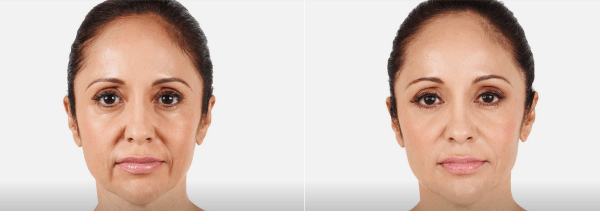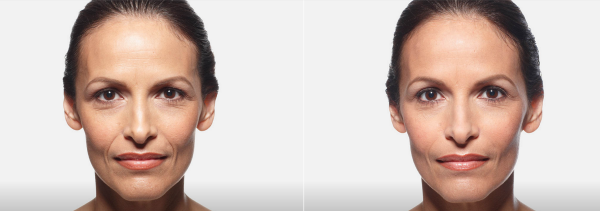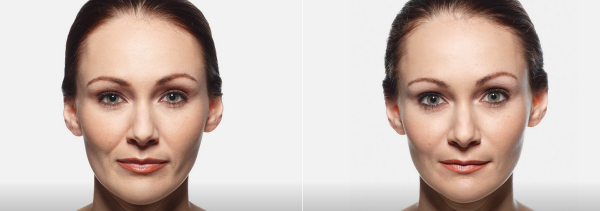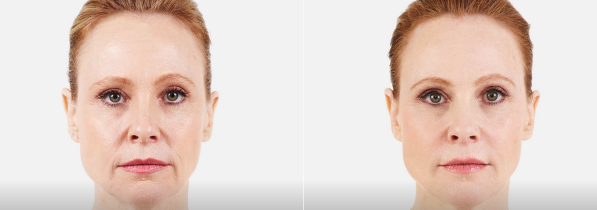What is Dermal Facial Filler treatment?
Dermal fillers such as Juvederm®, Restylane® and Sculptra® are used as an effective anti-ageing treatment for deep lines and wrinkles typically on the lower part of the face. Anti-ageing facial fillers are the non-surgical way to achieve younger looking skin by reducing deep lines and wrinkles, filling hollows, enhancing sunken cheeks and smoothing the contours of your face.
As your skin ages, it gradually loses some of its collagen which helps shape and support it. Over time, sun exposure, smoking, air pollution and even stress can all age your appearance. The face also loses volume, often leaving you with sunken cheeks and a ‘dragged down’ appearance.
Dermal fillers, sometimes referred to as facial fillers, use hyaluronic acid, a sugar that occurs naturally in the human body, to restore lost volume and definition within the skin, filling the deeper lines that appear typically between the nose and mouth and around the chin.
When undergoing Dermal Filler treatment, our Doctor or Cosmetic Nurse will inject small quantities of filler into the areas where you have lines, wrinkles or indents needing to be plumped up and made to look firmer. Results are effective immediately with results lasting up to 12 months. Our practitioners’ knowledge of the facial structure is vital to ensure you walk away with a natural-looking result.
Dermal Fillers are also used as Lip Fillers to help restore and enhance the shape and definition of your lips.
For lines on the upper part of the face, we would usually recommend using Anti-Wrinkle Injections. At your consultation, you will be advised what is the best treatment suitable to you and this sometimes may be a combination of both Dermal Fillers and Anti-Wrinkle Injections in order to achieve the desired result.
Before and After Gallery

-
Treatment time:
30-45 minutes -
Recovery time:
Immediate - 24hrs
-
Results duration:
6-12 months -
Treatment price:
from £200
FAQs
When performed by appropriately trained medical practitioners, Dermal Fillers are very safe. The hyaluronic gel is completely natural, and over time, the filler will slowly dissolve, causing no harm to you.
At Sheer Laser Clinic, you will only ever be treated by one of our highly trained Doctors or Cosmetic Nurses. We believe it is only safe to be administered by someone who is medically trained.
At Sheer Laser Clinic, every client’s needs are unique, therefore each client receives a bespoke consultation with the Doctor or Nurse. During the consultation you will be required to discuss your medical history as well as your problem areas. The practitioner will then discuss the desired improvements, treatment options available to you and the expected outcomes. When a suitable treatment has been agreed upon, the fillers can then be administered.
When administering treatment, your practitioner will apply a small amount of anaesthetic cream to the treatment area to help ensure your comfort throughout the treatment. Using a thin needle, they will inject the dermal fillers into carefully targeted areas of your face, just beneath the skins surface to replace the collagen and the hyaluronic acid supports layers which have been reduced. Your Doctor/Nurse may massage the area to ensure that the filler is smooth.
You should be able to see the results of your treatment immediately, although you may need to wait for slight redness or swelling to subside to fully appreciate the results.
You will be given clear aftercare instructions when you undergo Dermal Filler treatment at the Clinic. We will probably advise you not to wear make-up for up to 12 hours. You can carry on with your day as normal, however you should avoid direct sunlight, saunas and steam rooms for two weeks after your treatment.
You may experience a little temporary tenderness, swelling or bruising around the injection sites immediate after the procedure, and it is recommended that you avoid additional treatments in the same area for the next seven days.
It is also recommended that after your treatment, you maintain your overall skin health by using a cosmeceutical skincare regime to protect your skin from further ageing factors such as free radical and sun damage.
Dermal filler treatments typically last between six months to a year, after which they breakdown and are absorbed by your body. You may decide to book a another treatment before the fillers wear off.
Depending on the area treated, and which filler is used, recovery time can be from a few hours to a few days. However, most people find that they can return straight back to work after treatment with dermal fillers.
Most side effects are short-lived and mild and tend to be related to bruising and swelling around the injection sites. Usually these problems resolve themselves within a few hours of the treatment.
Other risks are less likely in the right hands but we will talk you through all of the potential side effects at your initial consultation, so you feel fully informed.
Dermal Fillers are the UK’s second most popular cosmetic procedure. Naturally you will have questions and some concerns about the treatment which is why we would start your journey by inviting you in for a one-to-one free consultation with our Doctor or Cosmetic Nurse, so that they can provide you with advice as to the most suitable form of treatment for you. We may recommend another treatment if there’s one that we believe would give you a better outcome; we may even advise you against treatment if we feel this to be in your best interest. At all times, we ensure that you receive an an honest assessment that puts your needs first.
As with any treatment to the skin, injections should be avoided in areas where the skin is swollen or where infections are present. If you have even the slightest allergic reaction to a particular filler, it cannot be used and you will need to use a different brand. Dermal fillers have not been tested in pregnant women, so their use would normally not be advised by practitioners if you are expecting a child. If you have suffered from a disease of the auto-immune system, you are likely to be allergic to bovine collagen and so it cannot be used. You need to provide the practitioner a detailed medical history at your consultation to avoid such outcomes. Conditions which are not suited to the use of bovine collagen include: rheumatoid arthritis; psoriatic arthritis; systemic or discoid lupus erythematosus; or polymyositis.
The first step
of your journey is to book a non-obligatory consultation giving you the opportunity to discuss your area of concern, the treatment you are considering, and your suitability for treatment.




